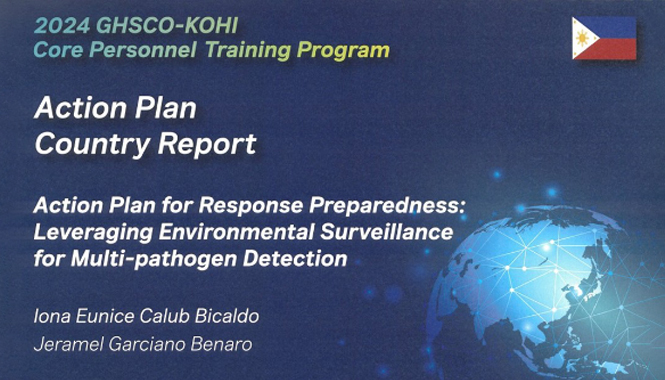
GHSCO Newsletter
September 2025
Volume2 Number3
Partner Stories2
Philippines Medical Technologist Reflects on the GHSCO Training Experience
This article is written based on the survey responses of trainees.
Jeramel G. Benaro, a medical technologist and a science research specialist at the Research Institute for Tropical Medicine (RITM) in the Philippines brought 14 years of experiences of diagnostic and clinical expertise along with more than a decade of interdisciplinary research in infectious diseases and public health. She joined the GHSCO Core Personnel Training Program to strengthen her knowledge in genomic surveillance, crisis leadership, and One-Health–driven policymaking.
As part of the program, she designed the initiative “Unlocking the Potential of Environmental Surveillance for a More Resilient One Health System.” While the project is currently on hold due to the ongoing development of Laboratory Information Systems (LIS) across reference laboratories, she continues to advocate for data integration and system harmonization, underscoring her long-term vision of linking environmental surveillance with the One Health System.
 Philippine trainees’ Action Plan
Philippine trainees’ Action Plan
Reflecting on the training, Benaro shared her experiences, saying that it enhanced her decision-making framework and improved her analytical and problem-solving skills. She noted that the program gave her great confidence in tackling complex health security challenges, boosting her productivity and adaptability in the workplace. Beyond these skills, she highlighted how the training prepared her to apply effective strategies in real-world public health emergencies.
Since completing the program, she has kept in touch with fellow trainees through Facebook, Instagram, Messenger, and WhatsApp, fostering professional network that extends beyond the classroom. She also suggested future opportunities—such as expert-led panel discussions, peer mentorship, alumni webinars, and outbreak simulation exercises—to strengthen the GHSCO alumni community.
She highly commended the training, especially noting its hands-on skill development in line with international standards, which put a strong emphasis on leadership growth. She also highlighted the program’s role-playing exercises, flexible delivery methods, and continuous education opportunities, which she described particularly valuable for professionals seeking to advance their expertise in global health security.